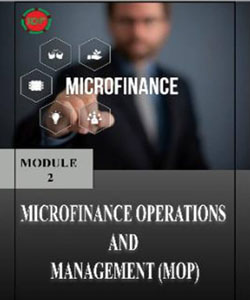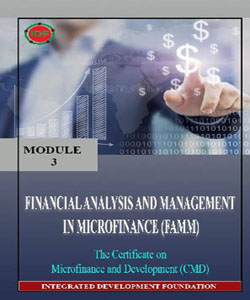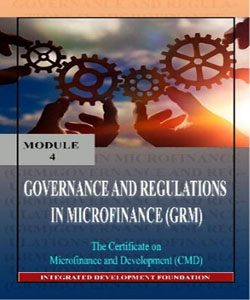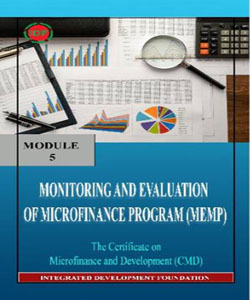
Certificate in Microfinance and Development (CMD) Course
Course Overview:
The Certificate in Microfinance and Development (CMD) is one of the cutting-edge courses that IDF offers for knowledge & appropriate skills development and capacity building for the growing practitioners of the microfinance sector.
IDF is the forerunner in offering Certificate Courses in Bangladesh where national and international participants get the theoretical understanding and practical experiences on the current dynamics of inclusive finance vis-à-vis microfinance through classroom sessions, hands-on training, case studies, exposure visits, and intensive supervised course work at their institution.This course will provide an in-depth understanding of the challenges and processes required to build business capability for the personnel of the microfinance industry. It is pertinent to be mentioned that a group of practitioners has developed this certificate program with proven experiences in the microfinance sector who were directly involved in piloting and implementing Grameen model, senior faculty members of Bangladesh Institute of Bank Management, leading practitioners of BRAC (the largest NGO of the world) and the Institute for Inclusive Finance and Development.
This course will help unlock participants’ critical insights into business potentials to enhance the capability to serve the organization more professionally.
Learning Outcomes:
On successful completion of the Certificate in Microfinance and Development (CMD), the participants will be able to:
Who Should Attend:
The course has been designed for the microfinance practitioners (mid-level to the senior-level staff of MFIs, who are responsible for program management, coordination, and supervision, are the target participants) working in the field and also for aspiring entrant who wants to develop a career in microfinance.
Why Should You Attend:
Course Modalities :
This online certificate course comprises five modules to be completed within four months. Three months (72 hrs. at participant’s pace, especially on the weekends) will be on theories, practices, cases, and home tasks, followed by one-month exhaustive fieldwork on the given assignment at their organization, project to be selected in consultation with the respective participants’ supervisors.
Module 1: Poverty Dynamics and Microfinance (PDM)
This module encompasses the theory of poverty dynamics, microfinance models, and development aspects. Upon completing this course, the participants will be able to explain different aspects of financial inclusion models, microfinance, poverty, and development issues of the country. They will also be able to identify the evolution and practices of microfinance in Bangladesh, India, Nepal, Myanmar, Bhutan, Pakistan through different real cases and will be able to get a broader insight. This module helps the participants visualize the scopes and challenges of inclusive finance vis-à-vis encourages them to build a career in the vibrant microfinance sector.
Key Note of the Course:
Module 2: Microfinance Operations and Management (MOP)
This module provides a holistic overview of microfinance operations and management. Upon completion of this module, the participants will develop a capacity to explain the microfinance delivery mechanism; assess enterprises and identify the appropriate borrower; identify various risks in microfinance and their controlling mechanisms; identify the causes and consequences of delinquency and explain the various ways of delinquency and non-performing asset management, etc. Further, the participants get the scope of broadening their skills to build competence for ensuring the organization’s operational sustainability.
Key Note of the Course:
Module 3: Financial Analysis and Management in Microfinance (FAMM)
The module provides a holistic approach to Financial Analysis as a means of early signaling techniques to avert loss due to delinquency/NPA (Non-performing Asset) and adopting appropriate decisions regarding microfinance operations. In this module, the participants get acquainted with the key techniques of financial statement analysis and developing a microfinance business plan, interpretation of Key Performance Indicators (KPI) for assessing viability and financial sustainability of MFI. This module also includes the discussion on the ideal scenario of asset-liability management and budgeting. With this module, the participants will have a solid knowledge of the contemporary issues of financial management in terms of microfinance operations.
Key Note of the Course:
Module 4: Governance and Regulations in Microfinance (GRM)
This module covers regulatory and governance aspects of microfinance from Bangladesh and a global perspective. It also aims at shedding light on the role of regulations in guiding microfinance programs, government policy and legal framework regarding microfinance in Bangladesh, and examples of other countries. The participants will be able to explain the appropriate governance structure and role of different governing bodies and gain the ability to identify internal control enabling elements in an MFI, and explain monitoring and supervisory compliance’s.
Module 5: Monitoring and Evaluation of Microfinance Program (MEMP)
This module has been designed to ensure effective monitoring and evaluation of microfinance programs. The course will assist in the development of practical knowledge on monitoring and evaluation of microfinance programs. The participants will also learn the ways to design an effective monitoring and evaluation system and to apply this in their own organizations to ensure long-term sustainability.






